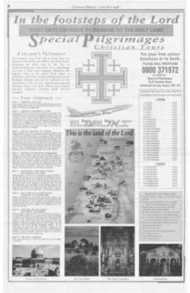Page 5, 15th May 1998
Page 5

Report an error
Noticed an error on this page?If you've noticed an error in this article please click here to report it.
Tags
Share
Related articles
Pakistani Christian Sentenced To Life In Prison Under...
Pakistan Encouraged To Abandon Blasphemy Laws
Thousands Mourn Catholic ʻmartyrʼ Shahbaz Bhatti
Far East
Portrait Of A Year
Why did Bishop Joseph die?
THE. TRAGIC DEATH of Dr John Joseph, Bishop of Faisalabad, who shot himself on 6 May, has been declared a martyrdom by the Vatican. Bishop Joseph's death was "the large sacrifice" which he himself had said earlier that day was the only way to end the oppression of Pakistani Christians. A courageous man,who for many years had been active and outspoken in human rights issues in Pakistan, he was driven to the ultimate protest by a sense of futility, frustration and helplessness.
The bishop chose as the place of his death, the court in Sahiwal. Here, exactly six months earlier, a Christian defendant, Ayub Masih, escaped death when fired at by .Muslim gunmen as he awaited his trial.
Ayub Masth was one of many Pakistani Christians accused under Section 295-C of the Pakistan Penal Code. This section relates to the offence of "defiling the sacred name" of Muhammad. He was found guilty on 27 April, awarded the mandatory death sentence and given 30 days to appeal.
Bishop Joseph had been closely involved in Ayub Masih's case. After the guilty verdict, he sought a lawyer to conduct the appeal without success. It seems that this brick wall drove the Bishop to protest the injustice of the situation in the most powerful way he could think of by laying down his own life.
Bishop Joseph chaired the National Commission For Justice and Peace, a human rights body established by the Catholic Bishops' Conference of Pakistan in 1984. Earlier this year he published a report entitled "Human Rights Monitor 97" dealing with the situation of religious minorities in Pakistan.
Pakistan's blasphemy laws originally prescribed lenient sentences for defiling any place of worship or deliberately outraging anyone's religious feelings (sections 295 and 295A).
In the 1980s two further parts were added. 295-B awarded life imprisonment for defiling the Qur'an. 295-C punished offences against Muhammad with life imprisonment or death. In 1991 the life imprisonment option for 295-C was disallowed, leaving death as the mandatory sentence.
These amendments resulted in a spate of accusations against Christians, Muslims and particularly Ahmadiyyas. Most cases against Christians appear to have ben fabricated by Muslims with a personal grudge against the accused, as in Ayub Masih's case. With no penalty for false accusation,
section 295-C was a powerful weapon.
Benazir Bhutto's government proposed amendments in 1994, which would have made the law less biased in favour of the accuser, but was forced to drop them because of threats from radical Islamists. Six people have been found guilty under section 295-C and sentenced to death. These comprise three Christians and three Muslims. AU were acquitted on appeal and no execulions have yet taken place.
The due process of law is not the only danger to someone accused of blasphemy. Once accused, the individual is at risk from zealous Islamists. Five people four Christians and one Muslim have been murdered as a direct result of being accused of blasphemy. The police show little enthusiasm for prosecuting the murderers. All three of the Christians found guilty have fled the country.
Not only the accused themselves but others associated with them are in danger. The judge who acquitted two of the Christians has been assassinated. The 135 other Christians in Ayub Masih's village left after threats to bum their houses and cattle. Small wonder that Bishop Joseph could not find a lawyer to handle Ayub Masih's appeal.
During his funeral in Faisalabad on 10 May, at which thousands of Christians called for the repeal of the blasphemy law, a nearby Christian colony was attacked by 400 to 500 militant Muslims who burned shops and houses, demanding that the law be left unaltered. They attacked the mourners returning home. Another Christian, Ranjah Masih, was arrested the day before the funeral under Section 295-B
for breaking a board carrying a Queanic verse.
Pakistan's Section 295-C is unique. No other Muslim country has this kind of legislation. It reflects the particular flavour of Pakistani Islam, which reverences the person of Muhammad to an unusual degree. Such Muhammad veneration explains also the deep desire of many sincere Muslims to avenge any alleged insults with death.
Joseph Courts, Bishop of Hyderabad, addressing a meeting of Asian bishops at the Vatican last month, spoke of the "rising tide of intolerance, militancy and oppression in Islam." He said: "The predominant attitude in Muslim countries considers Christians as secondclass citizens or traitors."
61'c:trick Sookhdeo is the Ds-rector o(the Barnabas Fund, which assists suffering churches in the Muslim world. He is also Dire-ctor of its administrational arm the Servants' Fellowship Internaticmal. Tel: 01672 564938
blog comments powered by Disqus













